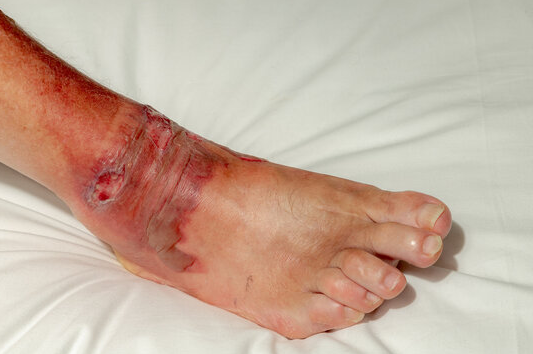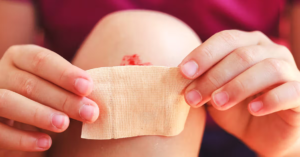Diabetic foot ulcers are among the most serious complications faced by individuals with diabetes. These wounds can develop quickly and are notoriously difficult to heal without specialized medical intervention. A diabetic wound doctor plays a critical role in addressing these stubborn wounds before they lead to more severe consequences such as infections or even amputations. For those searching for expert care, Kalingap Wound Care Clinic stands out as the best clinic to consult for non-healing foot ulcer treatment.
What Are Non-Healing Foot Ulcers?
Non-healing foot ulcers are open sores or wounds on the feet that do not improve with standard first-aid or over-the-counter treatments. They typically occur in people with diabetes due to poor blood circulation, nerve damage (neuropathy), and impaired immune responses. When left untreated, these ulcers can become infected and pose serious risks to overall health. A diabetic wound doctor understands these underlying causes and uses advanced techniques to promote healing and prevent complications.
Symptoms of non-healing foot ulcers include redness, swelling, drainage, odor, and visible tissue breakdown. Pain may or may not be present due to diabetic neuropathy, which can make early detection more difficult. Seeing a diabetic wound doctor early is key to effective management.
The Role of a Diabetic Wound Doctor
A diabetic wound doctor is a medical professional who specializes in treating chronic wounds related to diabetes. Their expertise goes beyond basic wound care, focusing on a multidisciplinary approach that includes infection control, vascular health, and advanced therapies. Unlike general practitioners, diabetic wound doctors are equipped with the knowledge and tools to tackle the root causes of non-healing wounds.
Patients who choose Kalingap Wound Care Clinic receive the benefit of having their care managed by highly trained diabetic wound doctors. The clinic uses evidence-based protocols and cutting-edge technology to provide faster and more effective results.
Diagnosis: First Step to Effective Treatment
Every successful treatment plan begins with a proper diagnosis. A diabetic wound doctor will perform a comprehensive evaluation, including medical history, physical examination, and diagnostic tests such as wound cultures or imaging. This allows the specialist to understand the severity of the wound and identify any underlying issues such as bone infection (osteomyelitis) or arterial blockages.
At Kalingap Wound Care Clinic, diabetic wound doctors use advanced diagnostic tools to assess the extent of tissue damage, infection, and circulation problems. This tailored approach ensures that treatment is both accurate and effective.
How a Diabetic Wound Doctor Treats Non-Healing Foot Ulcers
Treatment strategies used by a diabetic wound doctor are comprehensive and tailored to each patient’s specific condition. Key treatment methods include:
Debridement – This involves removing dead or infected tissue to promote healing and reduce the risk of infection. A diabetic wound doctor uses precise surgical or enzymatic techniques to prepare the wound bed for recovery.
Infection Control – Antibiotics, both oral and topical, may be prescribed after a proper bacterial culture. Wound dressings are changed regularly using sterile techniques. A diabetic wound doctor closely monitors for signs of infection such as pus, redness, or fever.
Offloading – To reduce pressure on the wound, diabetic wound doctors often recommend specialized footwear, orthotics, or total contact casts. Offloading helps prevent further damage and accelerates healing.
Advanced Dressings and Therapies – Modern wound care involves more than gauze. Diabetic wound doctors use moisture-retentive dressings, hydrocolloids, foam dressings, and negative pressure wound therapy (vacuum-assisted closure) to support healing. Some cases may benefit from the use of skin grafts or growth factor treatments.
Blood Sugar Management – High blood glucose levels delay healing. A diabetic wound doctor works closely with endocrinologists to ensure optimal glycemic control throughout the healing process.
Vascular Evaluation – Poor circulation is a common issue in diabetic patients. A diabetic wound doctor may refer patients for vascular studies or revascularization procedures if there are signs of arterial insufficiency.
Patients who receive treatment at Kalingap Wound Care Clinic benefit from all these approaches and more. Their diabetic wound doctors provide individualized care plans and closely monitor progress to ensure optimal healing.
Preventing Recurrence
Preventing future ulcers is just as important as treating the current one. A diabetic wound doctor educates patients on daily foot checks, proper hygiene, and the importance of well-fitting footwear. Routine follow-up appointments help detect issues early before they escalate.
Kalingap Wound Care Clinic emphasizes patient education and proactive care to prevent recurrence. Their diabetic wound doctors empower patients to take control of their foot health and avoid future complications.
When to See a Diabetic Wound Doctor
Early intervention is key. Anyone with diabetes who notices an open sore, swelling, discoloration, or a wound that doesn’t heal within a week should consult a diabetic wound doctor. Delaying care increases the risk of infection and long-term damage.
Kalingap Wound Care Clinic is the best place to seek timely and expert care. Their team of diabetic wound doctors is committed to saving limbs and lives through early detection and advanced treatment.
FAQ
What is the best treatment for non-healing diabetic foot ulcers?
The best treatment includes wound debridement, infection control, offloading, advanced wound dressings, blood sugar management, and sometimes vascular interventions—all of which are provided by a diabetic wound doctor.
Can diabetic foot ulcers be cured?
Yes, with proper care from a diabetic wound doctor, most foot ulcers can heal. However, ongoing management and prevention are essential to avoid recurrence.
How long does it take for a diabetic foot ulcer to heal?
Healing time varies but typically ranges from several weeks to a few months. A diabetic wound doctor monitors progress and adjusts treatment as needed for optimal results.
Do I need a referral to see a diabetic wound doctor?
While referrals can be helpful, many clinics like Kalingap Wound Care Clinic allow direct appointments with a diabetic wound doctor.
How do I prevent diabetic foot ulcers from returning?
Prevention includes daily foot care, blood sugar control, wearing protective footwear, and seeing a diabetic wound doctor regularly for check-ups.






